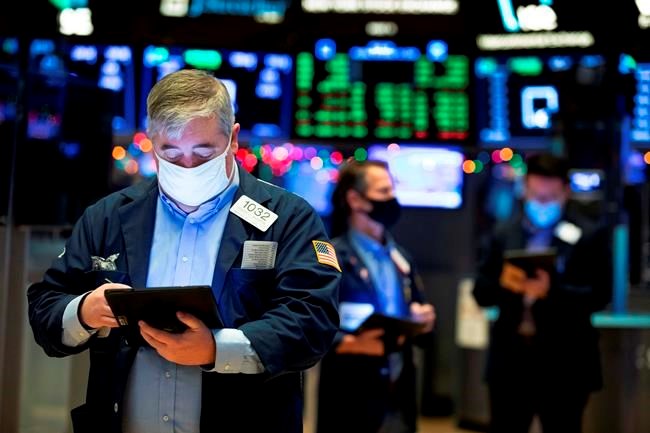Asian shares sank on Tuesday after a
Japan’s benchmark Nikkei 225 index fell after Prime Minister Yoshihide Suga announced a suspension of a travel promotion program that has helped businesses but also is thought to have helped spark a resurgence of coronavirus outbreaks.
The program was suspended from Dec. 28-Jan. 11, basically the entire New Year rush period, when most families head out on holidays or back to their hometowns. The Go To Travel program and another dubbed Go To Eat mainly provided steep discounts on hotel rooms and meals and has helped cushion the blow from the loss of nearly all inbound foreign tourism due to pandemic-related controls and concerns.
Also Tuesday, China's government announced a raft of monthly statistics showing retail sales, industrial output and investments in factory equipment and other fixed assets rose as expected in November. However, the Shanghai Composite index declined 0.4% to 3,356.11.
Other regional benchmarks also tracked Wall Street's retreat. Hong Kong's Hang Seng lost 0.5% to 26,252.50 and the Nikkei 225 in Tokyo gave up 0.3% to 26,648.83. South Korea's Kospi lost 0.5% to 2,750.85 while the S&P/ASX 200 shed 0.4% to 6,635.00.
Extending its pullback from recent months of gains, the S&P 500 fell 0.4% to 3,647.49 on Monday after having gained 0.9% earlier in the session. It was its fourth straight decline, the first since September. Losses in the financial, industrial and health care sectors led the retreat, outweighing gains by technology stocks and companies that rely on consumer spending.
Treasury yields were mostly higher, a sign of optimism in the economy. However, on Tuesday the yield on the 10-year Treasury slipped to 0.89% from 0.90% late Monday.
The Dow Jones Industrial Average dropped 0.6% to 29,861.55. The Nasdaq rose 0.5% to 12,440.04. Smaller companies held up better than their larger rivals, as the Russell 2000 index gained 2.16 points, or 0.1%, to 1,913.86.
Americans began receiving the country’s first vaccinations against COVID-19 on Monday, a process that's expected to take months.
Health care workers and nursing home residents are first in line for the shots, and the hope is that a wider rollout next year will help curb the pandemic and pull the economy back toward normal following the devastation of this year.
Surging coronavirus counts are slowing the economy’s momentum, seen last week in a worse-than-expected report on joblessness. Rising deaths are prompting governments to restore varying restrictions on companies. They're also scaring potential customers away from businesses.
Efforts to deliver another round of financial support for the U.S. economy have been stalled by bitter partisanship. Top Washington negotiators continued to reach for a long-delayed agreement on COVID-19 relief on Monday, but rank-and-file Democrats appeared increasingly resigned to having to drop, for now, a scaled-back demand for fiscal relief for states and local governments whose budgets have been thrown out of balance by the pandemic.
“Again, it feels like we are stuck in the negative feedback loop," Stephen Innes of Axi said in a commentary. “Unless policymakers overdeliver on market expectations, especially at this time of year when our risk-taking proclivities give way to profit-taking, it seems virus-related economic restrictions will never cease to weigh as the market (continues) to straddle that fence between hope and reality."
Even without another round of stimulus, investors are facing a robust environment heading into next year that includes low inflation and ultra-low interest rates.
Meanwhile, Hopes have risen for progress on a potential deal on the terms of the United Kingdom’s exit from the European Union.
The EU’s chief negotiator Michel Barnier said Monday he believes a trade agreement is possible following nine months of negotiations, now that remaining disputes have been whittled down to just two. Both sides are still teetering on the brink of a no-deal departure, though. They have committed to a final push ahead of Jan. 1, when a transitional period following Britain’s Jan. 31 departure from the bloc is to end.
In other trading, benchmark U.S. crude oil shed 23 cents to $46.76 per barrel in electronic trading on the New York Mercantile Exchange. It gained 42 cents to $46.99 per barrel on Monday.
Brent crude, the international standard, gave up 16 cents to $50.13 per barrel.
The U.S. dollar rose to 104.07 Japanese yen from 104.06 yen late Monday. The euro strengthened to $1.2162 from $1.2145.
___
AP Business Writers Stan Choe, Alex Veiga and Damian J. Troise contributed.
.
Elaine Kurtenbach, The Associated Press


